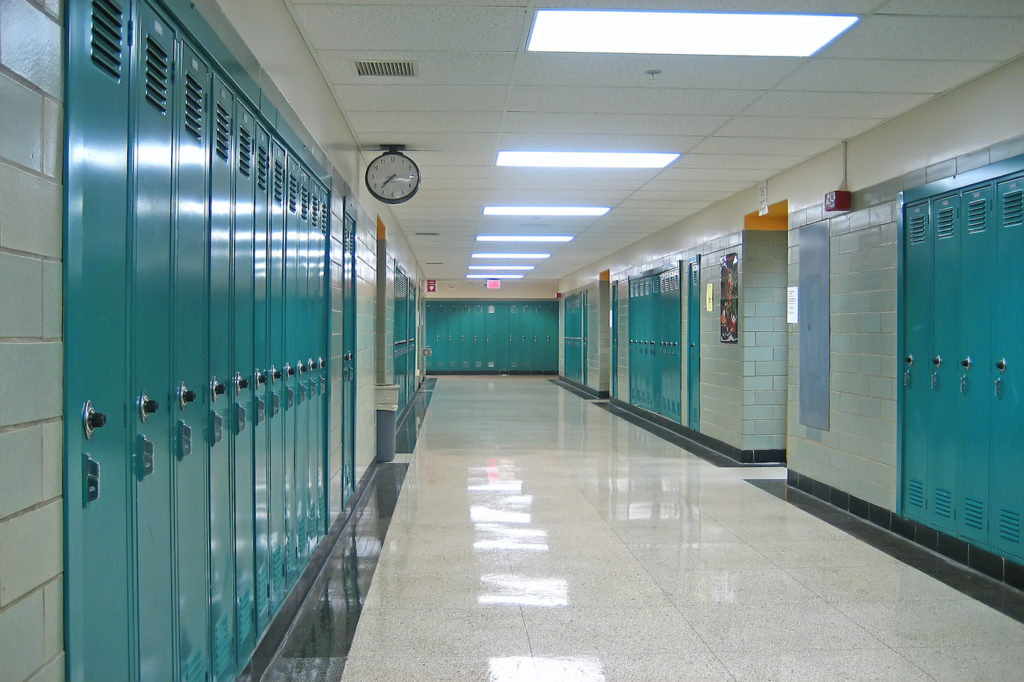If we judge modern liberal regimes in comparison to what preceded them, they fare quite well, even if they are not perfect. They have enabled relative peace and order, and unprecedented prosperity, while often managing to curtail the worst of government abuses.
A defining feature of modern liberal regimes, and a feature conducive to the desirable outcomes mentioned above, is a principle called “liberal neutrality.” According to this principle, government should not apply coercive law to matters of personal morality unless they are of public concern—even if we often disagree about what constitutes a public concern (e.g., restaurant smoking bans). Moreover, it entails that government should not favor any one religion, worldview, or value system.
However, K–12 public education, in its current condition at least, is in tension with this foundational principle of liberalism. Others have already noted this. Milton Friedman, for example, argued that public schools promote their own value systems, no more objective or neutral than any other.
What I will argue is that the value systems these schools promote correspond to what Spanish ethicist Ángel Rodríguez Luño calls a “politicized ethics,” and that those value systems are baked into the very institutional form of public schools. While this creates special problems for education policy, there are popular policies that can resolve them.
Start your day with Public Discourse
Sign up and get our daily essays sent straight to your inbox.Personal Ethics and Political Ethics
What does Ángel Rodríguez Luño mean by “politicized ethics”? To answer this question, we first need to consider how he understands the distinction between personal ethics and political ethics.
Personal ethics, as he understands it, concerns the pursuit of the good life—how we ought to act in general. Political ethics, on the other hand, has a more limited focus, namely, to direct law and other political activity toward their proper ends—the common good of “peace and justice.” Martin Rhonheimer points out that the historically developed ethos of modern liberal regimes closely corresponds with this limited focus on peace and justice—with a special emphasis on liberty rights.
To affirm a distinction between personal ethics and political ethics does not entail a belief that one can set aside one’s personal morality when making political determinations. Indeed, judgments of fairness or justice roughly take the form of the golden rule: “treat others as you would like to be treated.” Applying the golden rule correctly requires a reasonable understanding of how one should be treated; it presupposes that our judgment is not distorted by unreasonable, immature, or even vicious sensibilities and motivations about what we should want for ourselves or others we care about. Thus, political determinations depend on moral foundations that are more proper to the scope of personal ethics.
Some thinkers reject this division by reducing political ethics to personal ethics. In some ways, this was the position of Aristotle, whose model polis involved using the law to form virtuous citizens. Leaving aside issues of justice, this plan would simply be unworkable in a large pluralistic society.
The other extreme, which concerns us here, is that of reducing personal ethics to political ethics. It is this that Angel Rodríguez Luño calls the “politicization of ethics.”
Education and Politicized Ethics
Understanding how liberal neutrality applies to education is a complex task. Rhonheimer states that although liberal neutrality is appropriately applied to the law, it is entirely inappropriate for education itself—even if it can be applied, as I will clarify later, to education policy. Similarly, R. J. Snell highlights what he calls the “thinness” of procedural liberalism applied to education. He notes that education for our youth is devoid of any transcendence, inherited tradition, or moral compass. Public schools tend to instill the sense that anything beyond limited political values is relative and mere personal preference.
One way of understanding the transmission of moral values in public education is to consider its institutional characteristics. Yuval Levin likes to speak about how institutions form us. Indeed, institutions form us, or they deform us. They filter us in and filter us out. They have incentive and constraint structures, both informal and formal, that give rise to implicit or explicit rules for success, failure, advancement, and exclusion.
Public schools in a modern liberal society tend to impose a very specific kind of moral formation. Political goods—like justice, equality, and inclusion or peace and tolerance—are presented as legitimate ethical values in schools. Ethical discourse that goes beyond these political values, especially on subjects like religion or morality, is strongly discouraged both within school culture and externally through student and parental complaints—and often understandably so.
In this way, a “politicized ethics”—a personal ethics confined in its moral horizon to public values like peace, justice, liberty rights, tolerance, inclusiveness, and equality—quickly becomes the ruling ethos of public schools in a liberal regime. In a public school, or any secular school that opts to remain neutral, the bracketing of private morality all too easily becomes a relativization of other concerns. In secular universities, for instance, the explicit and implicit ethics that are taught tend to be consistent with these political limitations. Questions that address more expansive, especially controversial, issues of personal morality are often filtered out—unless they’re cloaked in scientific “objectivity” (e.g., by using the language of health).
To avoid this problem, universities could perhaps promote more viewpoint diversity, academic freedom, and healthy debate. However, for primary and secondary schools, the problem is more complex. Should developing minds face a cornucopia of competing perspectives before they’ve been fully formed in their families’ belief systems? One’s answer depends on one’s view of freedom, the human mind, the importance (or unimportance) of first principles, and so on. So even the question of how students should be introduced to competing views is itself controversial. It cannot be answered in a politically “neutral” way.
Education for our youth is devoid of any transcendence, inherited tradition, or moral compass. Public schools tend to instill the sense that anything beyond limited political values is relative and mere personal preference.
Truth and Tolerance
It is one thing if, out of a desire to protect the basic rights of individuals and families, we accept the robust educational pluralism that results from parents’ deciding how to educate their children, even if this means that some children will be raised by parents who do not give their children the best moral education. Children in such an arrangement will in most cases at least be able to build on the shoulders of their parents through schools that reflect their parents’ values.
It is another thing, however, to decisively favor a trimmed down, thin conception of morality in public education—a conception indifferent to the good life and entirely driven by political concerns. Thus, attempting neutrality in education ends up creating a systemic preference for a particular sort of ethical standpoint, a rather controversial one at that.
Someone might object that the domination of politicized ethics in public education is not so bad, because it ensures greater tolerance. But tolerance, rightly understood, entails respectful or just treatment toward those whose identity or beliefs differ in some way from our own. Tolerance is not the systemic exclusion or marginalization of different perspectives. If person A is a practicing Jew and person B is someone who embraces a politicized ethics, for B to impose his politicized ethics on A would be the same as if person A imposed Judaism on B. This homogenizing approach is self-defeating.
For a liberal society to survive, it needs a basic level of civic consensus. But this consensus cannot be sustainably achieved with the politicized ethics we find in public schools. By relativizing claims about the good life, this limited ethics erodes the very foundation of political values. As I noted earlier, justice and fairness only survive, and are only judged rightly, if people have a sound personal morality. And there is little evidence that politicized education has made people any more tolerant. In fact, it has only homogenized enough of the population to make tolerance less necessary within that group: outsiders still face intolerance and hostility, as “heterodox” teachers and students can attest.
For a liberal society to survive, it needs a basic level of civic consensus. But this consensus cannot be sustainably achieved with the politicized ethics we find in public schools.
Vouchers, ESAs, and Liberal Neutrality
Despite the difficulties that stem from ethical “neutrality” in education, teaching more substantive (and inevitably controversial) ethics in public schools would only cause more strife.
Perhaps radically decentralizing education could help. For instance, under a hyper-localized system, the curriculum would not have to manage the sprawling diversity of an entire country, state, or even county. If individual schools or classrooms could set their teaching agendas, administrators and teachers could evaluate their circumstances and handle diversity with prudence.
But a better solution would be to decouple the public financing of education from its administration. This could be done through programs like school vouchers or education savings accounts (ESAs), which allow parents to take back some of their tax money to spend it on private schools or homeschooling. This would be a more “neutral” solution, and therefore more compatible with liberal political principles.
In most states, public schools crowd out alternative schooling. That is, parents, having already paid their taxes, are confronted with a choice between a “free” option (public schools, which cost taxpayers nearly $15,000 a year per student) and a relatively expensive option (private schools, often classical or religious). This encourages many parents to choose the former over the latter. Although charter schools are a step in the right direction, by offering more choices to parents, they are still a kind of public school, and thus face some of these same issues—albeit with slightly more leeway, because parents opt into them.
If vouchers or ESAs were more widely available, however, parents could choose schools that reflected their values. If parents chose to keep their kids in public schools, it would likely be because these schools either reflected, or did not significantly oppose, those values. So long as opt-out means like vouchers and ESAs are available, the state would no longer be privileging more politicized value systems.
Americans would not tolerate public schools promoting a definite religion, nor would they tolerate it if public schools promoted a more substantial but ultimately controversial moral education—even if the morality could be defended philosophically. As someone who promotes such a moral education, I can accept that. But if that is the case, then we should also not accept the state’s effective promotion of a more hidden, yet equally sectarian, moral education. School vouchers and ESAs—or other policies like them—are a politically popular way of resolving this issue. So what is stopping us?














